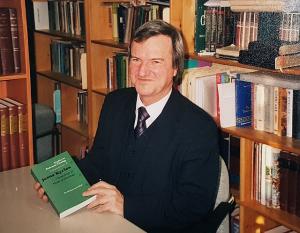“Reformed” and “Calvinist” Are Not Synonyms
I know I have written about this subject here before, maybe more than once. But I have new readers and readers who may have forgotten what I said then.
Recently I invited readers to join me in the future in a discussion of one of my favorite books: “Why? On Suffering, Guilt, and God” by Dutch Reformed theologian A. (Bram) van de Beek. I will be reading it for the fourth time!
Some potential participants asked if Beek (or van de Beek) is a Calvinist and seemed to assume he must be if he is Reformed.
Even in the 16th and early 17th centuries, not all people in Europe who would have identified as “Reformed” would accept the label “Calvinist.” Calvin was only one of many leading theologians of the Reformed branch of the Reformation. Still, to this day, especially in Europe, if you are Protestant you are either Lutheran (Evangelical) or Reformed (sometimes also called Evangelical). (In parts of Germany the Luther and Reformed churches were forced together by the Prussian king to form the Prussian Union Church. Those churches’ members, including my ancestors, who immigrated to the U.S. called their church here the Evangelical and Reformed Synod which eventually merged with the Congregational Church in America to form the United Church of Christ.)
Anyway…even Jacob Arminius was a Reformed minister as were his immediate followers who were expelled from the Reformed Church of the Netherlands and some other Reformed churches in Europe. However, they, the so-called Remonstrants, returned to the Netherlands after the Synod of Dort expelled them and formed their own denomination known to this day as the Remonstrant Brotherhood. The Remonstrant Brotherhood, Arminian in theology, is a charter member of the World Communion of Reformed Churches. How’s that for irony?
It’s is almost only in the United States that “Reformed” and “Calvinist” came to be identified as synonyms. And not all people who belong to Reformed denominations and churches would call themselves “Calvinists.”
I don’t know who is especially responsible for the POPULAR identification of “Reformed” and “Calvinist” in the U.S., but I can tell them and people today that the World Communion of Reformed Churches includes denominations that are not Calvinist although all of them probably pay lip service to the Reformed Confessions (The Heidelberg Catechism especially but Presbyterians to the Westminster Confession of Faith). One thing all contemporary Reformed churches seem to have in common is infant baptism which is why there are no Baptist conventions in the Communion. I have talked with “real Reformed theologians” about this and they have indicated to me that no credo-baptist church would ever be admitted to the Communion. That because, whatever else it means, being “Reformed” includes infant baptism but not baptismal regeneration.
The word “Reformed” is much larger than the world “Calvinist” and many Calvinists should not be considered Reformed—that according to many leading Reformed theologians I have talked to who do not want to be identified as Calvinists but definitely do stand within the wider Reformed community.
I think those of you contemplating reading and discussing “Why? On Suffering, Guilt and God,” should approach the book knowing that I do not think van de Beek is a Calvinist, at least the content of this particular books does not give me that impression. But he does stand within the Reformed tradition and was a professor of theology working in that tradition. The same can be said of, say, Hendrikus Berkhof, a leading Dutch Reformed theologian of the Netherlands. And South African theologian Adrio Koenig and others.
*If you decide to comment, make sure your comment is relatively brief (no more than 100 words), on topic, addressed to me, civil and respectful (not hostile or argumentative), and devoid of pictures or links.*














